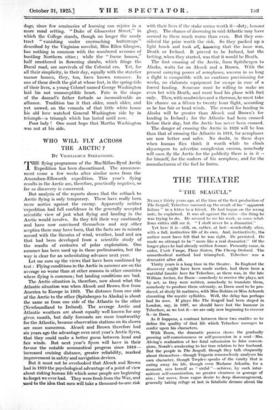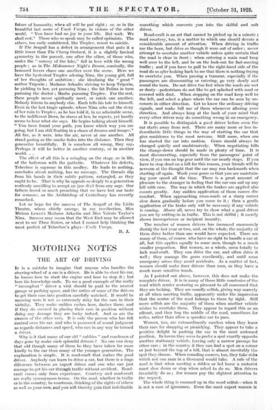THE THEATRE
"THE SEAGULL"
NEARLY thirty years ago, at the time of the first production of The Seagull, Tchechov summed up the result of his " apparent failure " in a letter to a friend. He had begun on the wrong note, he explained. It was all against the rulesâthe thing he was trying to do. He seemed to see his work, as some rebel- lious critics still see it. " I shall never be a dramatist."
Yet here it isâstill, or, rather, at lastâwonderfully alive, with a full, instinctive life of its own. And, instinctively, the author must have felt that he was right. He persisted. He made no attempt to be " more like a real dramatist." Of the longer plays he had already written Ivanov. Presently came, in order, Uncle Vanya, Three Sisters, The Cherry Orchard. The unmethodical method had triumphed. Tchechov was a dramatist after all.
Thirty years is a long time in the theatre. In England the discovery might have been made earlier, had there been a watchful fanatic here for Tchechov, as there was, in the late William Archer, for Ibsenâsomebody to receive the plays, act by act, as they were written, somebody to translate them, somebody to produce them solemnly, as Ibsen used to be pro- duced, at dimly lit matinees, with Miss Robins or Miss Achureli chaunting the mystic syllables. Well, the delay has perhaps had its uses. If plays like The Seagull had been staged in London, say, in 1897, we should have lost the humour in Tchechov, as we lost itâwe are only now beginning to recover itâin Ibsen.
As it happens, a contrast between these two enables us to define the quality of that life which Tchechov manages to confer upon his characters.
With Ibsen, the dramatic process shows the gradually growing self-consciousness or self-possession in a soulâMm.
Alving's realization of her fatal submission to false conven- tions, Norah's awakening to her true relation to her husband. But the people in The Seagull, though they talk eloquently
about themselvesâthough Trigorin remorselessly analyses his
own character, though Treplev- speaks of the vanity that is eating away his life, though even Madame Arkadin, for a moment, sees herself as " sinful "âachieve, by such inter- mittent self-examination, no greater clearness or ttourage of aim ; but move, from vague desire to deep discouragement, generally taking refuge at last in fatalistic dreams about the future of humanity, when all will be put right ; or, as in the beautiful last scene of Uncle Vanya, in visions of the other world. "'You have had no joy in your life. But wait. We shall rest." Those who so speak may be called optimists. The others, too early embittered, like Treplev, resort to suicide.
If 'The Seagull has a defect in arrangement that puts it a little lower than The Cherry Orchard, it is a slightly farcical symmetry in the pursuit, one after the other, of those who, under the " sorcery of the lake," fall in love with the wrong people ; as in The Midsummer Night's Dream, comically, the bemused lovers chase one another over the scene. Here we have the hysterical Treplev adoring Nina, the young girl, full of her thoughts of ambition ; she idealizing the " great " author Trigorin ; Madame Arkadin striving to keep Trigorin, he yielding to her, yet pursuing Nina ; the fat Polina in turn pursuing the doctor ; Masha pursuing Treplev. For the rest, these people never spiritually meet, or catch one another. Nobody listens to anybody else. Each tells his tale to himself. Even in the last tragic episode, where Nina sobs out the story of her ruin to Treplev, as he has told it, in an admirable scene, to the indifferent Dorn, he stares at her, he regrets, yet hardly seems to hear what she says. He begins talking about himself. " You have found your path, you know which way you are going, but I am still floating in a chaos of dreams and images." All fire, as it were, into the air, never at one another. All stand gazing as the smoke fades into the distance. Then they generalize beautifully. It is somehow all wrong, they say. Perhaps it will be better in another century, or in another world.. .
The effect of all this is a mingling on the stage, as in life, of the ludicrous with the pathetic. Whatever his defects, Tchechov is supreme in this medley. He leads to nothing, concludes about nothing, has no message. The threads slip from his hands in their subtle pattern, entangled, as they ought to be. That is why he appeals so deeply to a generation restlessly unwilling to accept an ipsc dixit from any sage. Our fathers heard so much preaching that we have lost our taste for sermons, as the Archbishop of Canterbury has recently remarked.
Let us hope for the success of The Seagull at the Little Theatre, where chiefly emerge, in my recollection, Miss Miriam Lewes's Madame Arkadin and Miss Valerie Taylor's Nina. Success may mean that the West. End may be allowed next to see Three Sisters, or what I cannot help thinking the most perfect of Tcheehov's playsâUncle Vanya.
R. J.































































 Previous page
Previous page